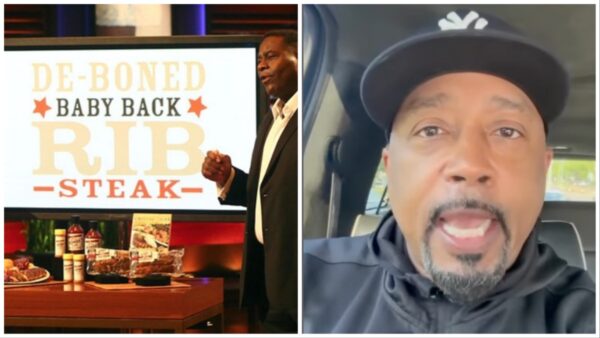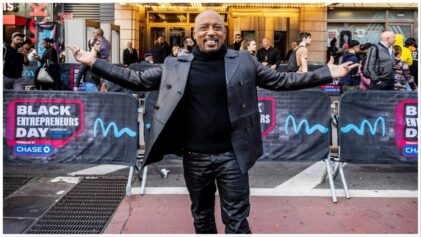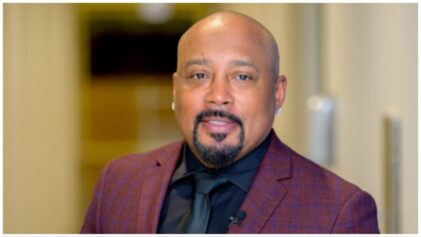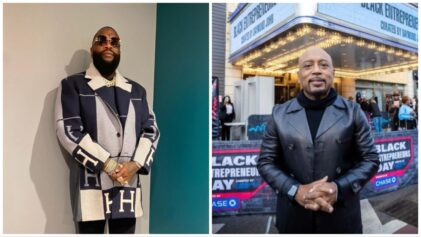Former NFL player Al “Bubba” Baker claims he was misled by Daymond John and his team of “Shark Tank” investors after accepting a deal for his boneless ribs business.
Baker appeared in two other competition series and had big dreams of expansion after reinventing the ribs experience for his wife, who found them to be “messy.”

He went from being known for football to being known for removing the bones from his barbecue ribs after cooking them while still maintaining that tasty signature flavor. Baker patented his boneless ribs in 2007 and his cooking process in 2011.
His daughter, Brittani Bo Baker, recommended he sign up for the ABC series, where he pitched his grand idea in order to snag a big-money deal for expansion and instant fame.
“The show was putting itself out there as the American dream,” he told the Los Angeles Times during a recent interview.
Baker and his daughter won the judges over after appearing on the show in September 2013 during its fifth season. He shared tasty samples of his ribs recipe and the backstory about his family’s barbeque restaurant back in Avon, Ohio.
The former athlete accepted John’s offer of $300,000 in return for a 30 percent stake in Baker’s company, contingent upon the former All-Pro defensive end receiving a licensing deal with a meat processing company.
Bubba’s Q Boneless Baby Back Ribs generated $16 million in revenue within three years after their products were promoted on the show. However, the Bakers say they only received 4 percent of that money — which equals $659,653 — and it’s “been a nightmare” ever since.
The Bakers have accused John and his partners of trying to take over and strip him of the profits for several money-making partnerships. They’ve since sold their home, their business has been struggling, and their family savings have been drained to help keep things afloat. After failing to keep up, Baker was forced to sell the restaurant, and his truck was also repossessed in the process.
The former Detroit Lions player claims he was given the impression that he would make millions, but instead, he received a mountain of disappointment. At the time, Baker had not considered the FUBU co-founder as an investor because he had no history of investing in food companies.
But he did sign several waivers and nondisclosure agreements to participate in the show without “asking a whole lot of questions.”
He claims John called him to revise the terms of their agreement after he returned home from his “Shark Tank” appearance. Instead of the $300,000 that was originally discussed during the taping, John only offered $100,000 for a 35 percent stake.
In a TikTok video shared on Twitter, Brittani claims John insisted they set up a website to capture sales from the day the episode would air. He went on to introduce the Bakers to a past “Shark Tank” contestant he initially described as an “internet genius” to help set it up.
Nate Holzapfel reportedly helped double the sale of ribs compared to the previous year, but financial issues quickly burdened the restaurant.
The video also featured screenshots of emails Brittani received from Holzapfel, noting that he would pay vendors “late on purpose.” She said they attempted to move away from working with him, but John advised against it.
“The night the episode aired Nate sent us this email saying every precaution that can be made has been but Nate never set up sales taxes on the sauces. The day after airing, we had to refund over $30,000 worth of sauces.”
Holzapfel also managed Bubba’s business account, which Brittani recalled had $100,000 in it. She claims the then-34-year-old reportedly closed the account in June 2014 and sent the Bakers an $8,000 check. She also accused Holzapfel of using funds from another “Shark Tank” company to fund Bubba’s.
Holzapfel is currently awaiting trial on charges of communication fraud, theft and sexual abuse.
The Bakers were also reportedly introduced to another man, named Larry Fox, who allegedly had ties to John’s business dealings, unbeknownst to the family. However, John claims they knew Fox was his personal attorney. He also serves as the general counsel of John’s Shark Group.
By 2015, the Bakers found themselves working with a manufacturer called Rastelli Foods Group, who allegedly misrepresented the amount of produce they could handle from Bubba’s Q boneless ribs.
After John’s persistence, Baker entered a three-way deal with John and the manufacturer. As noted in the article and by Brittani, John, Fox, and Rastelli, kept the Bakers out of financial discussions and decisions.
After receiving only $2,900 in profits and a $61,917.45 licensing fee from a 2016 deal that was projected to earn the company about $193,000, the family refused to move forward until accounting issues were handled.
In return, Rastelli filed a lawsuit with the Superior Court of New Jersey in 2019 “in violation of his fiduciary duties.” According to the terms of the lawsuit, his daughter received the financial information, which she deemed “incomplete.”
Rastelli agreed to pay Baker $100,000 in 12 installments in the settlement, noting that the business earned $14.5 million. Now the Bakers are stuck dealing with a $171,000 bill from the attorneys despite receiving only a $553.35 profit check to account for January to March 2023.
“The whole thing sounds pretty shady… not a good look Daymond,” wrote one individual, to which the Bakers responded, “It is shady and it’s still going on he has a confidential payment arrangement with our copacker we have no access to real time accounting.”
John claimed he also lost money behind his investment in a statement to the Los Angeles Times, where he also seemingly denied “taking money from a small business.”
After facing criticism and harassment online, he responded further in a three-minute video also shared on Twitter and Instagram.
“I’m not one to give oxygen to false information and bogus claims – especially ones that are rehashing things that were addressed through the legal process.I took out nearly 4 years ago. But I know when I need to stand up for myself,” he tweeted. “Here are my thoughts on the recent @latimes story that has tried to take down Shark Tank and go after me.”
John claims the Bakers “intentionally broke the confidential agreement” to put out this story of “untrue” allegations. He also accused the reporter of not understanding the rules of business to his liking and releasing a “flawed interview” full of “false narratives.”
“I could have sent a cease and desist and said stop you guys are already violating that your agreement, but I didn’t,” he said. “I was hoping that the truth would come out.”
He continued, “Anyone with common sense would say, ‘After 10 years of these people have such of a case of all these wrongdoings, wouldn’t one of those six attorneys they had stay there?’”
But the Bakers are not the first to accuse John of breach of contract or cast doubt on his business practices. The article states that some previous claims have been resolved through settlement while others were dismissed.
In 2020, John was accused of inflating the price of N95 masks during the pandemic via a deal to exchange one million masks for the state of Florida at seven dollars each, as reported by the Miami Herald. The deal was ultimately canceled, and a statement was released stating that John was “only trying to help…procure and vet the equipment.”
Several Rejected Black-Owned Companies Became Major Successes
In season 2 of “Shark Tank,” Shawn Davis failed to receive funding and support for his shrimp burger company, Big Shake’s Hot Chicken and Fish. The judges were displeased that he only had around $30,000 in sales at the time.
However, within a year after his appearance, he said he was offered a “better deal” by another investor that was better than the $200,000 for a 25 percent equity stake he requested. There are currently three locations open in Tennessee.
Entrepreneur Michael Elliot was also rejected by all three judges after pitching his idea to open a chain of nail salons for men called Hammer and Nails. He received an invitation to compete in the show in 2014 — seven months after opening the first location.
Elliot told the judges his company had generated $150,000 and was expected to hit $250,000 by the end of that year. The writer of the popular film “Brown Sugar” sought a $200,000 deal at a 20 percent stake.
Since the rejection, he has opened over two dozen locations, including his most recent in San Antonio, Texas, last month.
The Lip Bar is another currently thriving company that found success thanks to Melissa Butler, whose vegan lipstick brand was rejected during her “Shark Tank” appearance in 2015. The company she launched with bright, bold colors has now become the largest Black-owned makeup brand available in Target stores worldwide.
“Shark Tank” Winners That Received Big Investments and Failed
In season 1, episode 5, Cactus Jack Barringer pitched a wellness product called the Body Jac, designed to make pushups easier for people who struggle with working out. He made a deal with John’s associate Barbara Corcoran, who agreed to invest after Barringer proved the machine worked by losing 30 pounds.
After he lost the weight, Corcoran and another colleague, Kevin Harrington, invested a total of $180,000 into his idea for a stake of 50 percent equity. Eventually, the company went out of business and Corcoran regretted the deal, publicly calling it one of the worst deals she’s made on “Shark Tank.”
In season 2, a subscription service called Toygaroo was pitched by a woman entrepreneur as “The Netflix for toys.” The rental company allowed consumers to rent toys each month and return them. In separate rounds, investors Mark Cuban and Kevin O’Leary invested a combined $200,000 at a 35 percent and 45 percent stake, respectively.
After her appearance, the small company saw a spike in sales but was unable to keep up with the growth, cost, and shipping. Toygaroo was closed for business a year later in 2012.
John and the other judges raised a total of $1 million for a 30 percent equity stake in a company whose portable breathalyzer connects to a smartphone app. Founder Charles Michael Yim pitched the Breathometer in episode 2 of season 5 in 2013.
Unfortunately, the company was sued by the Federal Trade Commission for advertising the product as a “law enforcement grade” device, according to Mobile Health News. The commission also took issue with consumers being encouraged to use the device to determine whether it was safe for them to drive or not.
The company eventually went out of business after having to refund and notify all its customers about the device. Cuban, who accounted for half of the amount invested, called it one of his worst investments ever during an interview with CNBC’s “Make That.”


